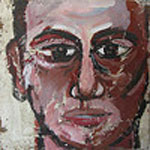Farah Kobaissy had some time to kill Saturday morning. She was headed to a meeting in Lebanon’s northern Akkar district that was delayed a few hours, so she instead decided to visit friends in the Nahr al-Bared Palestinian refugee camp.
Kobaissy, 23, did not have her state ID card (hawiyah), only her identification papers (ikhraj kayd). The Lebanese army, which still surrounds the camp and controls entry and exit to both the official camp and the surrounding areas commonly known as the “new camp,” would not let her enter, even though, she told NOW Lebanon, she’d been allowed in with her identification papers “dozens” of times in the past.
Palestinians trying to enter the camp, even former residents, need special permits. Kobaissy, incensed by her own denial of entry and generally against the permit process for the Palestinians, decided to stage a protest.
She crossed the street, bought a poster board and made a sign that read, “No to the humiliating permits in Nahr al-Bared Camp.” Kobaissy said she positioned herself in front of one of the army’s checkpoints and, before long, found herself being questioned by a member of the military intelligence, who was dressed in plainclothes.
Military intelligence detained and questioned Kobaissy, an activist, blogger and university student pursuing her Master’s degree, for around 14 hours because of her protest. Her repeated requests to call a lawyer or make a phone call were denied, she said. Military intelligence also brought in two men Kobaissy insisted she did not know and who were not involved in her act of defiance.
This is the third time in three months military intelligence has detained critics of the army’s continued control of Nahr al-Bared. The camp, well known to local resident Palestinians and Lebanese from the surrounding Akkar district as a center of commerce prior to 2007, gained international infamy that year as the army fought a months-long battle with militants from a shadowy and still mysterious group called Fatah al-Islam.
The war completely destroyed the camp, and its residents have yet to return in significant numbers as the reconstruction process moves at a glacial pace. It has been over three years since the army declared victory. Some news reports indicate that fears of Fatah al-Islam re-establishing a base in the camp are driving the army’s access control policies. But retired Lebanese Armed Forces (LAF) General Elias Hanna disagrees.
“No, Fatah al-Islam is already broken up,” he said. “Now, the army, I think, from a security perspective, they follow political orders, not military ones.” Rebuilding, he said, is a touchy subject for Lebanese politicians, ever-fretful of Palestinian naturalization (tawteen). As the process drags on, the army is in control and requires Palestinians hoping to enter to get permits.
Workers helping rebuild schools in the “old camp” area along the river need three permits to do their jobs, Milad Salameh, a Palestinian who is part of the committee following up on reconstruction, told NOW Lebanon.
“One for the new camp, one for the old camp and one for the area of the schools of UNRWA,” he said, referring to the UN body established to provide services for registered Palestinian refugees. Not only is the system itself cumbersome, Salameh said, but Palestinians often face problems if there are small errors – which they are not responsible for making – on their permits.
“For example, if the number of the registration file or name or age of the mother [is wrong], they are not allowed to enter,” Salameh said.
Like Kobaissy, other critics of the army’s policies have been detained recently. On October 9, Ghassan Abdullah, director general of the Palestinian Human Rights Organization, went for a cup of coffee after being invited by military intelligence, according to a press release.
“Upon arrival, he was brought [in] for interrogation,” the release said. He was questioned about connections to a European group “perceived as Zionist” and a dialogue his group hosted about access policies concerning Nahr al-Bared, according to the release. Ghassan was outside of the country when NOW Lebanon tried to reach him.
Around two months prior to Ghassan’s three-hour detention, Ismael Sheikh Hassan, an urban planner, was detained for three days apparently because of an article he wrote in As-Safir which satirically criticized all of the players involved in the slow moving reconstruction process.
While Hassan was still in custody, his colleague Amer Saadiddine told NOW Lebanon that “targeting him is a clear message to all of us. There can be no critique of Nahr al-Bared; no critique of the army.”
When NOW Lebanon contacted the army’s headquarters to request the number of the military intelligence press office, an officer provided a phone number and then asked the purpose of the call.
“You think you will get answers?” the officer replied gruffly after being told NOW Lebanon wanted a comment on Kobaissy’s detention. “The number I gave you is wrong. I just wanted to know why you were calling,” he said, refusing to then provide the correct number.

















